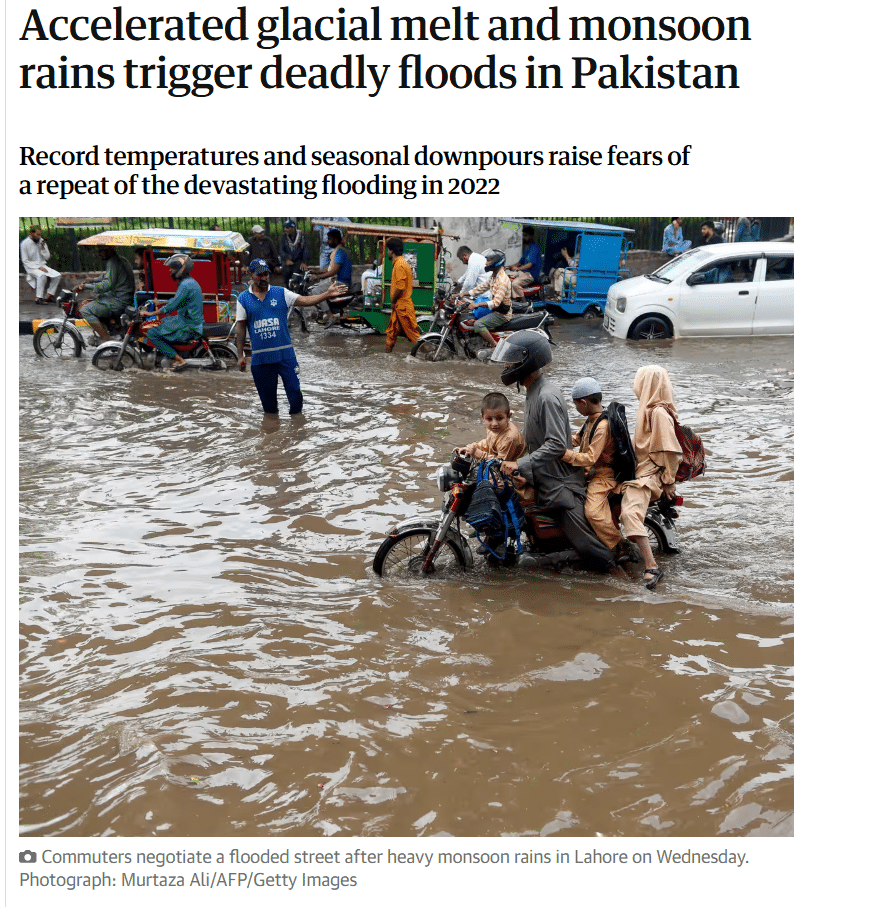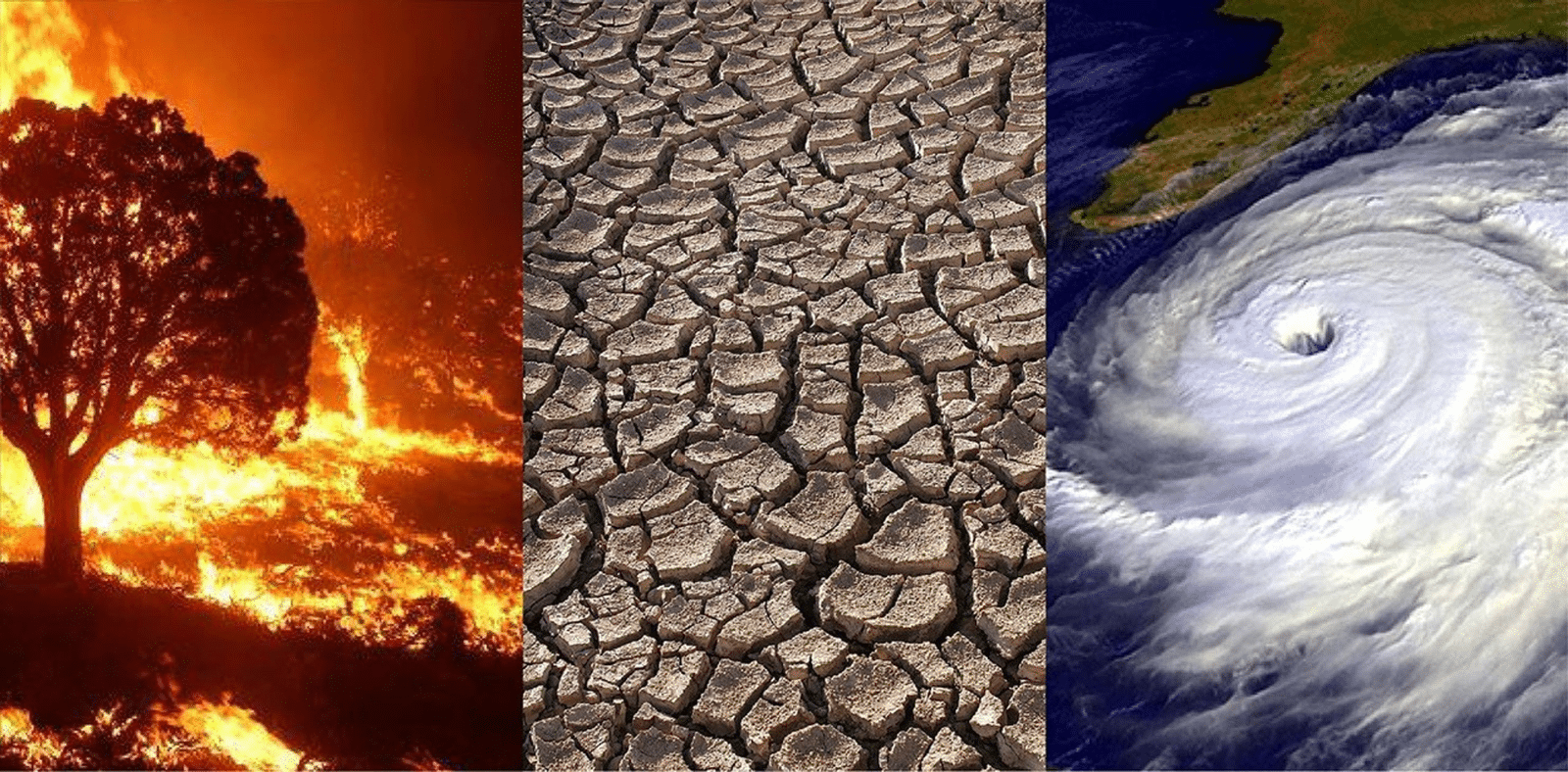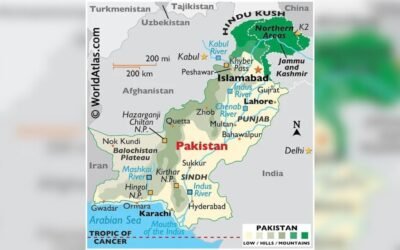Pakistan’s rural heartland is facing a profound transformation as climate change alters farming patterns, local customs, and long-held seasonal traditions. In Gilgit-Baltistan and the northern mountains, glaciers are melting at unprecedented rates—temperatures have reached 48.5°C, triggering flash floods that have washed away entire villages and submerged agricultural land (The Guardian). These climatic shocks are not temporary—they threaten traditional livelihoods and cultural continuity, prompting the state to intervene and adapt.

Source: The Guardian
Forced Migration and Cultural Displacement
Floods, droughts, and heatwaves are uprooting rural residents. In Sindh and Balochistan, monsoon failure and desertification have led to mass internal migration, with whole communities relocating to urban slums in Karachi, Lahore, and Islamabad, leaving behind their ancestral farmland and fading customs (TheNews). Families once tied to the land are now struggling to adapt, and with them go seasonal rituals tied to farming rhythms and harvest celebrations.
Loss of Seasonal Rhythms
The traditional calendar, marked by sowing and harvest festivals, is being rewritten. In Punjab’s Thal desert, milder spring rains no longer match cultural events like the Syed Inayat Shah Mela and Thal Jeep Rally. Once aligned with planting seasons and weather patterns, these events now face unpredictable scheduling as climate becomes more erratic. Attendance has dropped, vendors and performers are few, indicating a decline in cultural continuity.
Threats to Nomadic Traditions
Pakistan’s Bakarwal pastoralists, who for centuries migrated seasonally with their herds, now struggle to find grazing lands. Northern pastures are drying up, forcing them to either buy fodder or abandon migration, which threatens their identity and disrupts the wool, dairy, and leather economy. The state has responded by introducing subsidised fodder programmes, mobile veterinary clinics, and GPS-based pasture monitoring, integrating tradition with innovation to preserve cultural livelihoods.
Diminishing Biodiversity and Cultural Connection
The decline in migratory birds, by over 50% in key Sindh wetlands, is more than an ecological loss. It signals harm to cultural symbols and seasonal rituals tied to these natural phenomena. The government has launched wetland conservation efforts and eco-tourism initiatives to protect these ecosystems, highlighting the vital link between the environment and culture.
Disruption of Mountain Livelihoods and Festivals
In Swat and Chitral, local festivals marking seasonal movement and harvest have become rare. Families settle in towns, leaving farmlands abandoned. This has led to a decline in cultural ceremonies, making it difficult to sustain indigenous languages and customs. To counter this, provincial governments are supporting mobile schools, heritage workshops, and cultural archives, reviving traditions even in relocated communities.
State-Led Adaptation and Cultural Preservation
The government is proactively responding. The Ministry of Climate Change and provincial governments are coordinating efforts in:
- Disaster relief and resettlement: Emergency housing, rebuilding roads in Gilgit-Baltistan, and providing seed grants for flood-affected farmers.
- Agricultural innovation: Promoting drought-resistant crop varieties, introducing high-yield seeds, and offering microcredit to pastoralists, ensuring farming traditions can continue under new conditions.
- Cultural conservation programmes: Funding local festivals, supporting Saraiki cultural events, and reviving camel markets and rural fairs, backed by tourism promotion and climate adaptation grants.
- Livestock support: Supplying subsidised fodder and veterinary services to nomadic communities, helping maintain traditional herding routes.
- Ecosystem restoration: Planting mangroves in coastal villages, reforestation in Ziarat, and wetland rehabilitation in Sindh—all moves that protect livelihoods and cultural heritage.
These initiatives underscore the state’s commitment to intertwining climate resilience with cultural integrity.
Challenges on the Horizon
Despite strong interventions, challenges persist. Urban migration continues unchecked in many flood-affected districts, resulting in overcrowded city environments and cultural fragmentation in the lives of migrants. Early marriages, disrupted education, and loss of traditional roles, especially among women, are growing concerns in resettled communities.
Furthermore, government efforts require sustained funding and collaboration across departments. Provincial adaptation funds need expansion to cover remote communities, and policy coherence between climate, agriculture, education, and cultural ministries remains essential.

Source: Le Monde
Roadmap for Sustainable Traditions
To ensure cultural continuity alongside climate resilience, Pakistan is planning:
- Capturing oral traditions: Rolling out digital storytelling platforms and local archives to record languages, folklore, and rituals.
- Festival-linked relief: Aligning relief programmes with local festivals and planting seasons to reinforce cultural significance.
- Education close to home: Funding climate-resilient rural schools and outreach programmes to support seasonal migrants and maintain children’s education and cultural connections.
- Women’s economic empowerment: Strengthening cottage industries based on traditional crafts, supported by microcredit and market access.
- Eco-cultural tourism: Developing trails, cultural tours, and wildlife tours, particularly in Gilgit-Baltistan, to protect heritage and create livelihoods.
Climate change is transforming Pakistan’s rural tradition, disrupting migration patterns, cultural festivals, and community life. However, the government is responding with strategic policy measures that blend climate adaptation with cultural preservation, including reforestation, livestock support, heritage funding, festival restoration, and eco-tourism. Although challenges remain, particularly in urban migration and funding gaps, the government’s multi-sectoral, proactive approach demonstrates an understanding that cultural resilience is closely linked to climate resilience.
By protecting traditions alongside livelihoods, Pakistan can ensure that its rural communities not only survive environmental shocks but also adapt with dignity, preserving their cultural identity and enriching the national fabric. The country has demonstrated that when climate policy is grounded in cultural understanding, both people and heritage have a better chance of thriving.







